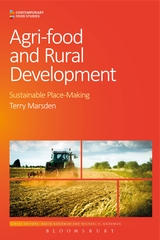Contested Sustainabilities: The Post-carbon Future of Agri-food, Rural Development and Sustainable Place-making
DOI:
https://doi.org/10.5304/jafscd.2019.084.018
Keywords:
Food, Governance, Post-carbon Economy, Rural Development, Sustainable Food Systems, Sustainable Place-makingAbstract
First paragraphs:
Terry Marsden has enormous experience working in the fields of agri-food, rural development, and sustainable place-making. He digs deeply into his experience in this book, looking back over the recent history of food and rural development, analyzing current trends in these areas, and looking forward in an age of great uncertainty, both environmental and political, to better understand and promote sustainable food systems.
He begins by positing a significant transition from neoliberalism and production agriculture to a looming choice between what he refers to as the bio-economy and the eco-economy. He describes the former as being “characterized by exogenous development through corporate controlled production of biological products (fuels, mass, technology, enzymes, genomics) for global markets” (p. 92). Backed by the Organization for Economic Cooperation and Development (OECD) and endorsed by the European Union, the bio-economy is the post-carbon offspring of neoliberalism: a little more aware of its shortcomings, but still enmeshed in a business-as-usual paradigm. In essence, it “incorporates the multiple ways in which rural and urban people and their institutions manage and manipulate the biosphere which sustains their existence and creates economic value out of its non-renewable and renewable resources” (p. 22). . . .
Metrics

Downloads
Published
How to Cite
License
Copyright (c) 2019 The Author

This work is licensed under a Creative Commons Attribution 4.0 International License.
The copyright to all content published in JAFSCD belongs to the author(s). It is licensed as CC BY 4.0. This license determines how you may reprint, copy, distribute, or otherwise share JAFSCD content.











